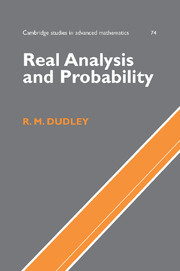Book contents
- Frontmatter
- Contents
- Preface to the Cambridge Edition
- 1 Foundations; Set Theory
- 2 General Topology
- 3 Measures
- 4 Integration
- 5 Lp Spaces; Introduction to Functional Analysis
- 6 Convex Sets and Duality of Normed Spaces
- 7 Measure, Topology, and Differentiation
- 8 Introduction to Probability Theory
- 9 Convergence of Laws and Central Limit Theorems
- 10 Conditional Expectations and Martingales
- 11 Convergence of Laws on Separable Metric Spaces
- 12 Stochastic Processes
- 13 Measurability: Borel Isomorphism and Analytic Sets
- Appendix A Axiomatic Set Theory
- Appendix B Complex Numbers, Vector Spaces, and Taylor's Theorem with Remainder
- Appendix C The Problem of Measure
- Appendix D Rearranging Sums of Nonnegative Terms
- Appendix E Pathologies of Compact Nonmetric Spaces
- Author Index
- Subject Index
- Notation Index
- References
12 - Stochastic Processes
Published online by Cambridge University Press: 06 July 2010
- Frontmatter
- Contents
- Preface to the Cambridge Edition
- 1 Foundations; Set Theory
- 2 General Topology
- 3 Measures
- 4 Integration
- 5 Lp Spaces; Introduction to Functional Analysis
- 6 Convex Sets and Duality of Normed Spaces
- 7 Measure, Topology, and Differentiation
- 8 Introduction to Probability Theory
- 9 Convergence of Laws and Central Limit Theorems
- 10 Conditional Expectations and Martingales
- 11 Convergence of Laws on Separable Metric Spaces
- 12 Stochastic Processes
- 13 Measurability: Borel Isomorphism and Analytic Sets
- Appendix A Axiomatic Set Theory
- Appendix B Complex Numbers, Vector Spaces, and Taylor's Theorem with Remainder
- Appendix C The Problem of Measure
- Appendix D Rearranging Sums of Nonnegative Terms
- Appendix E Pathologies of Compact Nonmetric Spaces
- Author Index
- Subject Index
- Notation Index
- References
Summary
Stochastic processes have been treated so far mainly in connection with martingales, although a general definition was given: a stochastic process is a function X of two variables t and Ω, t ∈ T, Ω ∈ Ω, where (Ω, , P) is a probability space and for each t, X(t,·) is measurable on Ω. Taking T to be the set of positive integers, any sequence of random variables is a stochastic process. In much of the more classical theory of processes, T is a subset of the real line. But by the 1950s, if not before, it began to be realized that there are highly irregular random processes, useful in representing or approximating “noise,” for example, which are in a sense defined over the line but which do not have values at points t. Instead, “integrals” W(f)= ∫ W(t)f(t)dt are defined only if f has some smoothness and/or other regularity properties. Thus an appropriate index set T for the process may be a set of functions on ℝ rather than a subset of ℝ. Such processes are also useful where we may have random functions not only changing in time but defined also on space, so that T may be a set of smooth functions of space as well as, or instead of, time variables. At any rate, the beginnings of the theory of stochastic processes, and a basic existence theorem, hold for an arbitrary index set T without any structure.
Information
- Type
- Chapter
- Information
- Real Analysis and Probability , pp. 439 - 486Publisher: Cambridge University PressPrint publication year: 2002
